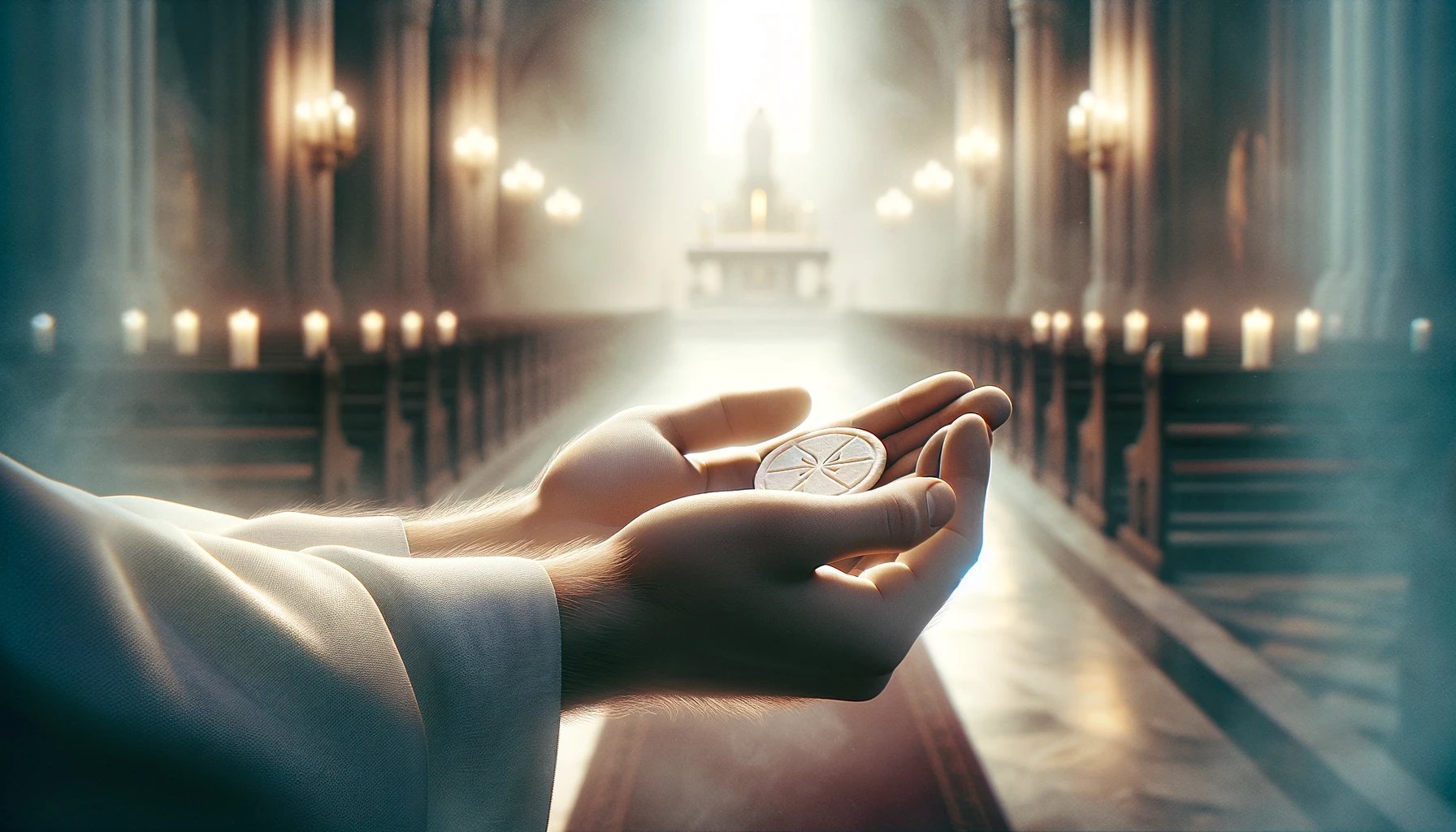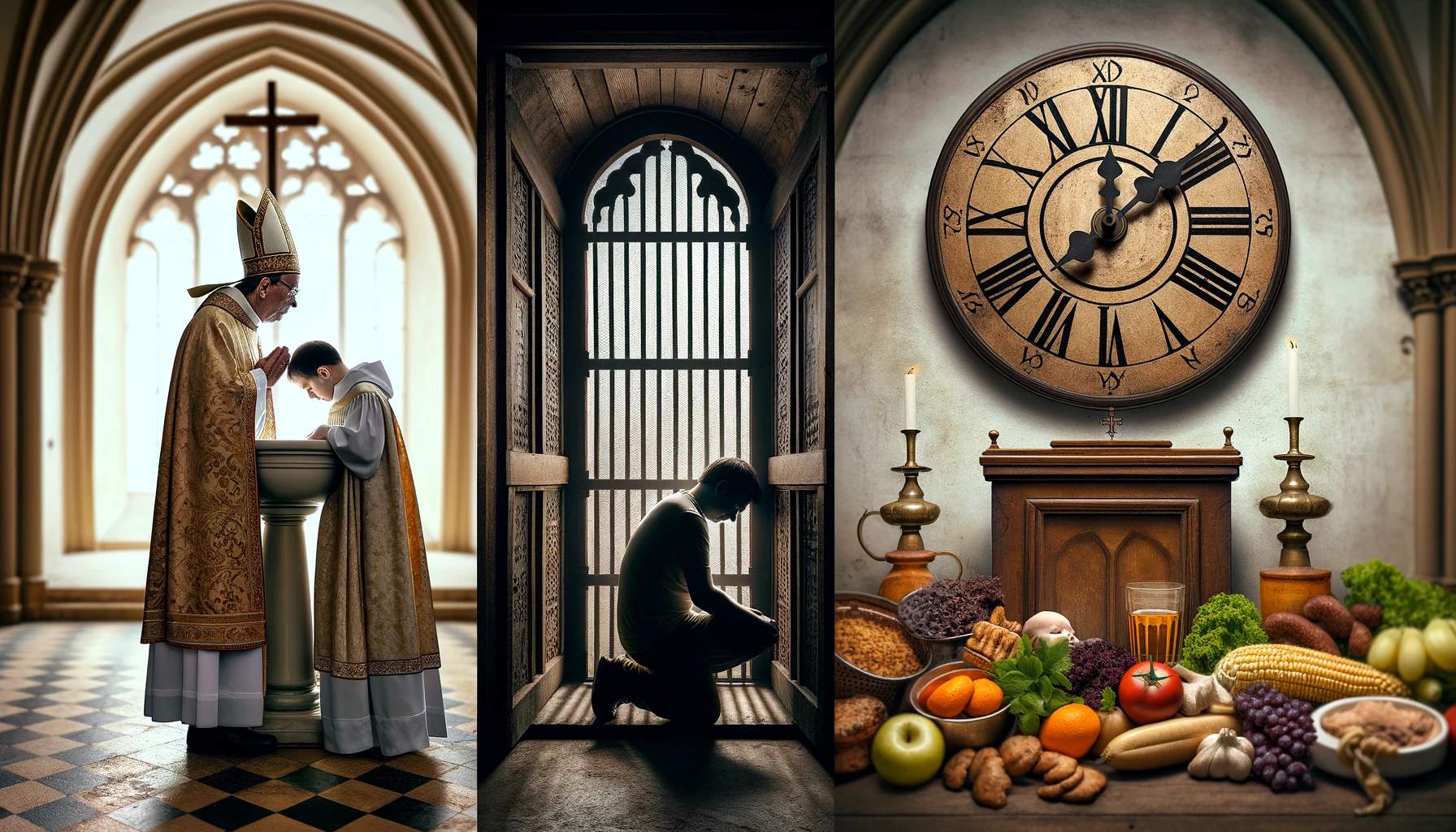Home>Theology and Spirituality>What Do You Pray After Receiving Communion


Theology and Spirituality
What Do You Pray After Receiving Communion
Published: February 19, 2024
Jason DeRose, Managing Editor at Christian.net, uses his expertise in religion and journalism to deepen understanding of faith's societal impacts. His editorial leadership, coupled with a strong academic background, enriches the platform’s diverse content, earning him recognition in both journalism and religious circles.
Discover the significance of post-communion prayers and deepen your understanding of theology and spirituality with our insightful guide. Explore the meaning and purpose of these prayers today!
(Many of the links in this article redirect to a specific reviewed product. Your purchase of these products through affiliate links helps to generate commission for Christian.net, at no extra cost. Learn more)
Table of Contents
Introduction
After receiving communion, many individuals engage in a moment of reflection and prayer. This sacred act, often performed within the context of a religious service, holds deep spiritual significance for believers across various traditions. The post-communion prayer serves as a pivotal moment for expressing gratitude, seeking spiritual nourishment, and fostering a deeper connection with the divine.
The act of receiving communion, also known as the Eucharist or Lord's Supper, holds a central place in Christian worship. It symbolizes the partaking of the body and blood of Jesus Christ, signifying a profound spiritual union with the divine. Following this solemn ritual, individuals often turn to prayer as a means of expressing their reverence and seeking spiritual guidance.
Beyond the Christian faith, other religious traditions also observe similar practices, each with its own unique post-communion prayers. These prayers serve as a bridge between the sacred act of communion and the individual's spiritual journey, providing a moment for introspection, gratitude, and supplication.
In the following sections, we will explore the purpose of post-communion prayer, delve into the diverse traditions and their respective post-communion prayers, examine the content of these prayers, and consider the personal significance and application of this sacred practice. Through this exploration, we aim to gain a deeper understanding of the profound spiritual significance of post-communion prayers and their role in nurturing the spiritual lives of believers across different traditions.
Read more: What To Do After Receiving Communion
The Purpose of Post-Communion Prayer
The post-communion prayer holds profound significance within religious traditions, serving as a pivotal moment for believers to engage in intimate communication with the divine. This sacred practice serves multiple purposes, each contributing to the spiritual nourishment and growth of the individual.
First and foremost, the post-communion prayer provides a space for expressing gratitude. Following the reception of communion, individuals often feel a deep sense of thankfulness for the spiritual nourishment and the profound symbolism inherent in the act of partaking in the body and blood of Christ. The prayer becomes a vehicle for articulating this gratitude, allowing individuals to acknowledge the significance of the communion experience and its impact on their spiritual journey.
Additionally, the post-communion prayer serves as a means of seeking spiritual nourishment and renewal. Believers view the act of communion as a source of spiritual sustenance, a moment of intimate connection with the divine. The post-communion prayer, therefore, becomes an opportunity to seek continued guidance, strength, and renewal in one's faith journey. It serves as a moment of communion with the divine, where believers seek to be spiritually fed and sustained by the grace and presence of the sacred.
Furthermore, the post-communion prayer fosters a deeper connection with the divine and with fellow believers. It serves as a communal expression of faith, as individuals come together in prayer following the shared experience of communion. This collective act of prayer reinforces the sense of spiritual unity and shared devotion among the worshippers, strengthening the bonds of community and reinforcing the shared spiritual journey.
In essence, the purpose of post-communion prayer encompasses expressions of gratitude, seeking spiritual nourishment and renewal, and fostering a deeper connection with the divine and the community of believers. This sacred practice holds a central place in the spiritual lives of individuals across various traditions, offering a moment of profound significance and spiritual communion with the divine.
Different Traditions and Their Post-Communion Prayers
Across diverse religious traditions, the post-communion prayer holds a significant place in the spiritual practices of believers. Each tradition brings forth its unique expressions of reverence, gratitude, and supplication in the form of post-communion prayers, reflecting the distinct theological and cultural nuances of their faith. Let's explore some of these traditions and their respective post-communion prayers:
Christian Tradition:
In the Christian tradition, post-communion prayers vary among denominations and liturgical practices. For example, in the Roman Catholic Church, the post-communion prayer often reflects themes of thanksgiving, seeking spiritual strength, and a deepening of the believer's union with Christ. The Anglican tradition also emphasizes gratitude and spiritual nourishment in its post-communion prayers, often drawing from rich liturgical language to express the profound significance of the communion experience.
Eastern Orthodox Tradition:
Within the Eastern Orthodox tradition, post-communion prayers are deeply rooted in the mystical and sacramental theology of the faith. These prayers often emphasize the transformative nature of the Eucharist, seeking spiritual healing, and a deepening of the believer's union with God. The post-communion prayers in the Eastern Orthodox tradition reflect the profound sense of awe and reverence for the sacred mysteries of the Eucharist.
Lutheran Tradition:
In the Lutheran tradition, post-communion prayers often center around themes of gratitude for the redemptive work of Christ, seeking spiritual nourishment, and a renewed commitment to living out one's faith in the world. These prayers reflect the Lutheran emphasis on grace, faith, and the transformative power of the Eucharist in the life of the believer.
Other Religious Traditions:
Beyond the Christian faith, other religious traditions also observe post-communion prayers in various forms. In the Anglican tradition, the post-communion prayer often emphasizes gratitude, spiritual nourishment, and a deepening of the believer's union with Christ. The post-communion prayers in the Eastern Orthodox tradition reflect the profound sense of awe and reverence for the sacred mysteries of the Eucharist.
Personalized and Informal Prayers:
In addition to formalized post-communion prayers within liturgical settings, individuals across traditions often engage in personalized and informal prayers after receiving communion. These prayers may vary widely, reflecting the individual's personal spiritual journey, struggles, and aspirations. They serve as intimate expressions of faith, gratitude, and the longing for spiritual nourishment and guidance.
In essence, the post-communion prayers across different traditions offer a rich tapestry of expressions, reflecting the diverse theological emphases, cultural influences, and individual spiritual experiences within each tradition. These prayers serve as a profound means of connecting with the divine, expressing gratitude, and seeking spiritual nourishment and renewal, enriching the spiritual lives of believers across various traditions.
The Content of Post-Communion Prayers
Post-communion prayers encompass a rich tapestry of themes, expressions, and supplications, reflecting the profound spiritual significance of the communion experience. These prayers, deeply rooted in theological and spiritual insights, encapsulate the essence of gratitude, spiritual nourishment, and a deepening of the believer's union with the divine. Across different religious traditions, the content of post-communion prayers resonates with the core tenets of faith and the transformative power of the communion experience.
Gratitude forms a central theme in post-communion prayers, as believers express profound thankfulness for the spiritual nourishment received through partaking in the body and blood of Christ. These prayers often articulate a sense of awe and reverence for the sacred mysteries of the Eucharist, acknowledging the profound significance of the communion experience in shaping the believer's spiritual journey. The language of gratitude in post-communion prayers reflects the deep sense of appreciation for the redemptive work of the divine and the ongoing grace extended to the faithful.
Seeking spiritual nourishment and renewal also permeates the content of post-communion prayers. Believers turn to these prayers as a means of seeking continued guidance, strength, and sustenance in their faith journey. The prayers often express a longing for spiritual healing, transformation, and a deepening of the believer's union with the divine. They serve as a poignant expression of the believer's dependence on the grace and presence of the sacred, seeking to be spiritually fed and sustained by the profound significance of the communion experience.
Furthermore, the content of post-communion prayers often reflects a communal dimension, emphasizing the shared spiritual journey of believers within the faith community. These prayers express a collective longing for unity, mutual support, and a shared commitment to living out the faith in the world. They reinforce the bonds of spiritual fellowship and solidarity among worshippers, fostering a sense of communal devotion and shared reverence for the transformative power of the Eucharist.
In essence, the content of post-communion prayers encapsulates themes of gratitude, spiritual nourishment, and communal devotion, reflecting the profound spiritual significance of the communion experience within diverse religious traditions. These prayers serve as a poignant expression of the believer's reverence for the sacred mysteries of the Eucharist, their longing for spiritual nourishment and renewal, and their commitment to a shared spiritual journey within the faith community.
Read more: What To Pray During Communion
Personal Reflection and Application
After partaking in the solemn act of communion and engaging in the post-communion prayer, individuals often find themselves in a moment of deep personal reflection and spiritual application. This sacred practice extends beyond the confines of the religious service, permeating the fabric of their daily lives and shaping their spiritual outlook. The post-communion prayer serves as a catalyst for personal introspection, fostering a profound sense of spiritual awareness and application in various aspects of the believer's life.
Personal reflection following the post-communion prayer often leads individuals to contemplate the transformative power of the communion experience in their lives. It becomes a time for introspective examination, as they seek to apply the spiritual nourishment and renewal received during communion to their daily endeavors. This introspection may prompt a renewed commitment to living out the values and teachings embodied in the communion experience, inspiring individuals to embody compassion, forgiveness, and grace in their interactions with others.
Furthermore, the post-communion prayer often sparks a heightened sense of spiritual awareness, prompting individuals to seek moments of quiet contemplation and prayer in their daily routines. This heightened awareness serves as a reminder of the sacred union experienced during communion, inspiring individuals to cultivate a deeper connection with the divine in their everyday lives. It encourages them to seek moments of spiritual nourishment and reflection, fostering a continuous sense of communion with the sacred beyond the confines of the religious service.
The application of the post-communion prayer extends to the realm of community and service, as individuals are inspired to embody the spirit of gratitude, compassion, and selflessness in their interactions with others. The communal dimension of the post-communion prayer resonates in their commitment to fostering unity, mutual support, and shared devotion within their faith community. This application extends to acts of service and outreach, as individuals seek to manifest the transformative power of the communion experience through their engagement with the broader community.
In essence, the post-communion prayer engenders a profound personal reflection and application, inspiring individuals to embody the transformative power of the communion experience in their daily lives. It prompts a heightened spiritual awareness, a commitment to living out the values embodied in communion, and a dedication to fostering unity and service within the faith community and beyond. This sacred practice serves as a wellspring of spiritual inspiration, shaping the way individuals navigate their spiritual journey and engage with the world around them.













